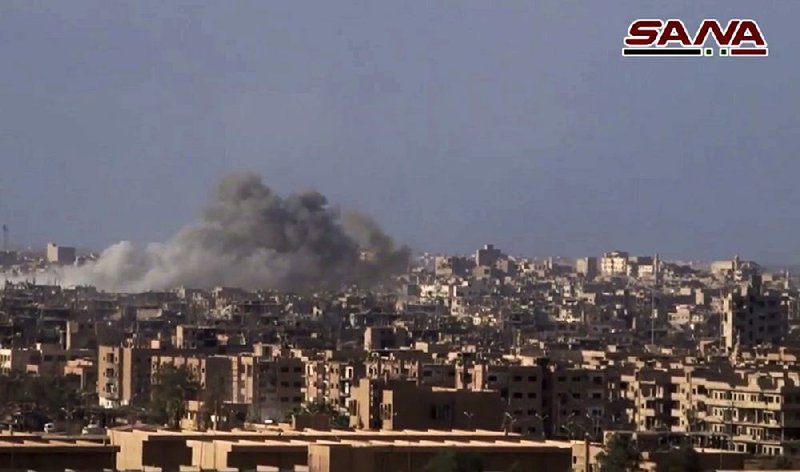DAMASCUS, Syria -- Syrian troops ousted Islamic State extremists Friday from Deir el-Zour in eastern Syria, while Iraqi forces retook Qaim, the group's last big town across the border in Iraq, in simultaneous assaults that dealt further territorial losses to the retreating militants.
With their self-proclaimed "caliphate" crumbling, the extremists have lost almost all their urban strongholds in Syria and Iraq.
The defeats left the Syrian town of Boukamal as the only urban area still completely under the Islamic State's control, along with scattered pockets of territory along the Syria-Iraq border.
Syrian troops backed by Russia and Kurdish-led forces supported by the United States are now racing toward Boukamal from opposite sides of the Euphrates River, triggering concerns that a proxy showdown could ensue between the two sides.
[THE ISLAMIC STATE: Timeline of group’s rise, fall; details on campaign to fight it]
Both the U.S. and Russia have embedded special forces with their respective partners and are supporting their advances with airstrikes. Maj. Gen. Igor Konashenkov, a spokesman for the Russian Defense Ministry, said six Tu-22M bombers struck Islamic State targets near Boukamal, while two Russian submarines in the Mediterranean also launched six cruise missiles at Islamic State targets.
The Syrian Observatory for Human Rights reported that shelling from the Iraqi side of the border hit the small Syrian town of Abughaz, near Boukamal. Civilians were forced to flee, but no casualties from the shelling were reported, the Britain-based group said.
"With the loss of Deir el-Zour, Daesh loses its ability to lead terrorist operations by its militants who are now isolated and encircled [in the] eastern countryside of the city," said Gen. Ali Mayhoub, declaring victory in a statement read on Syrian TV. He used an Arabic name for the Islamic State in the broadcast.
Video broadcast on state-run media outlets showed the last moments of the fighting in Deir el-Zour, including shelling by Syrian tanks and plumes of smoke rising over the city's mostly destroyed neighborhoods of Jamiayat and Jabiliyeh before they were liberated.
The recapture of Deir el-Zour on the west bank of the Euphrates is another victory for President Bashar Assad's forces and his Russian and Iranian allies. Deir el-Zour, which had been divided into a government-held and an Islamic State-held part for nearly three years, is the largest city in eastern Syria and the capital of the oil-rich province of the same name. It is also the largest city to be recaptured by the Syrian government from the Islamic State group.
Mayhoub described it as the "last phase" of the military's campaign toward the annihilation of the Islamic State group in Syria. He hailed the city's recapture as a strategic win, noting its location on a crossroads linking the country's eastern, northern and central regions, as well as an "oil and gas reservoir" -- a reference to the province.
In Iraq, troops recaptured the town of Qaim across the border from Boukamal, the government said.
Iraqi Prime Minister Haider al-Abadi congratulated Iraqi forces on retaking Qaim just over a week after the operation began. In a statement from his office, al-Abadi described the victory as taking place in "record time."
Earlier in the day, Iraqi forces also retook the nearby Husaybah border crossing with Syria, according to the prime minister's office.
Qaim, about 200 miles west of Baghdad in the Euphrates River Valley, has been used by the Islamic State to move fighters and supplies between the two countries at the height of the caliphate, when the Islamic State held nearly a third of both Iraq and Syria.
Information for this article was contributed by Susannah George and Maamoun Youssef of The Associated Press.
A Section on 11/04/2017
